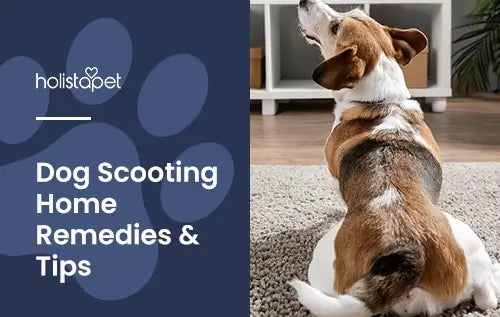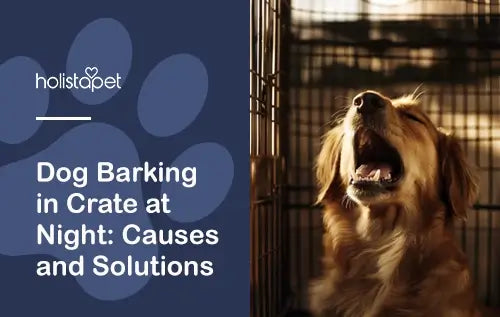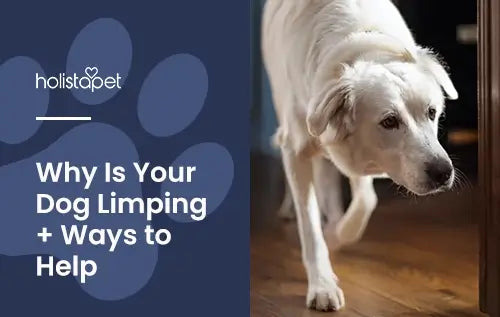Dog scooting can look funny, but it's nothing to laugh at. This strange phenomenon is often a sign of something amiss with your furry friend. The good news? There are plenty of home remedies for dog scooting to help your pup feel better fast.
With enough know-how, pet owners like you can tackle the problem head-on. Let's explore easy, effective ways to help your canine companion scoot less and smile more!
What Is "Scooting" and Why Does It Happen?

Scooting is when a dog drags their rear end across the floor. It might make you giggle, but it's no laughing matter. This behavior usually means your dog is feeling off down there.
When your pup scoots, it's their way of saying, "Help me out!" Understanding why dogs scoot is the first step to bringing them relief.
Common Causes of Scooting
Scooting is your dog's way of trying to find relief or saying something's not quite right. Several culprits could be behind your pup's slide across the floor. This nuisance can be caused by clogged anal glands, internal parasites, itchy skin, or dietary problems. Understanding these causes helps you quash the issue quickly and keep your canine bestie feeling comfy.
Anal Gland Issues
Anal glands can cause trouble when they're full or clogged. These tiny sacs near the anus release a strong-smelling, oily substance called anal gland fluid when dogs defecate. When the glands don't empty properly, our canine friends might scoot to find relief.
Dog owners must address anal gland problems quickly. Ignoring full or impacted anal glands can lead to discomfort or even anal gland infection. Regular anal gland expression and other natural solutions can help keep things running smoothly down there.
Parasites (Worms and Fleas)
Did you know that parasites are common culprits behind scooting? Intestinal parasites can cause itching and irritation around your dog's rear end. Meanwhile, fleas biting sensitive areas can lead to excessive licking or scooting for relief.
These unwelcome visitors not only make your furry buddy uncomfortable but can also affect their health. Through regular deworming and flea prevention, you can keep these pests at bay.
Related Post: Simple & Effective Home Remedies for Worms
Allergies or Skin Irritation
Allergies or skin irritation can leave your pup feeling itchy and restless. Scooting often becomes a source of relief. Food allergies or environmental triggers like grass or pollen can cause sensitive skin around your dog's bum. Even grooming products can sometimes cause irritation.
If your dog's scooting comes with redness or frequent licking, allergies could be to blame. Try switching to hypoallergenic foods or using gentle, pet-safe products to bring some relief.
Dietary Imbalances
A fiber-deficient diet can lead to soft bowel movements in dogs. Loose stools make it harder for your dog's anal sacs to empty naturally, leading to discomfort and scooting.
On the flip side, food allergies can upset your dog's gut. This issue can then cause irritation and snowball into scooting.
Adding fiber-rich foods like canned pumpkin or switching to a high-quality diet can work wonders for your pup's gut health. When their meals remain balanced, their bum stays happy—and so do you!
How To Identify the Cause of Scooting

Figuring out why your dog is scooting can feel like solving a mystery. But with a little detective work, you can pinpoint the root of the problem. Watch for these clues:
- Check for Anal Gland Issues. Look for swelling or signs of discomfort near your dog's anus. A foul-smelling liquid may also be present.
- Inspect Your Dog's Stool. Soft bowel movements or signs of worms could point to intestinal parasites.
- Look for Skin Irritation. Redness, rashes, and itchy or dry patches around their bum could signal allergies or irritation.
- Track Their Diet. If their scooting started after a diet change, it could mean food sensitivities.
- Watch for Frequent Licking. Constant licking of the rear can mean discomfort.
Can Scooting Stop on Its Own?
Sometimes, scooting resolves itself, but it depends on the cause. If the scooting lasts more than a day or seems frequent, take it as a sign that something more serious is happening.
Addressing the issue early—whether it's anal glands, parasites, or allergies—prevents bigger problems down the road. A little proactive care goes a long way in keeping your pup happy and scoot-free.
Home Remedies for Dog Scooting
Is your pup scooting like crazy? Home remedies can save the day! Simple solutions like adding fiber to their diet, using warm compresses, or even expressing anal glands at home may help solve the issue. Let's explore how they work.
Expressing Your Dog's Anal Glands at Home
Expressing anal glands at home might sound tricky, but it's easier than you think. With a pair of gloves and some patience, you can gently release the built-up fluid causing your dog's discomfort. Make sure to use a clean, calm environment to keep your pup relaxed. If you're unsure, consult your vet to feel more confident and prepared to handle the task.
Can I Help My Dog Express Their Glands Naturally?
You can help your dog express their glands naturally by encouraging healthy habits. Regular exercise and a fiber-rich diet promote firm stools. Firmer stools help naturally empty the anal glands during bowel movements. This keeps everything flowing smoothly, reducing the need for manual expression.
Improving Your Dog's Diet With Fiber
Fiber helps firm up your dog's stool, which naturally aids in emptying the anal glands. Foods like canned pumpkin, sweet potatoes, or high-quality kibble with added fiber are great options. A small adjustment to your pup's diet can make a big difference in their comfort and your peace of mind.
Using Natural Supplements for Gut Health
![Probiotics For Dogs [Soft Chews] - HolistaPet](https://cdn.shopify.com/s/files/1/0765/3946/1913/files/Probiotic-Infographic-1_472d7a29-e30c-435a-9638-1365d8c3a9f9_600x600.jpg?v=1725384841)
Natural supplements like probiotics can support your dog's gut and overall comfort. A healthy gut supports regular bowel movements, which can help keep anal glands clear. Probiotics also balance gut bacteria, promoting better digestion and immune health.
HolistaPet's Probiotic Soft Chews for Dogs are a fantastic option. These tasty, easy-to-use chews help improve digestion and reduce discomfort. A happy gut means a happier, scoot-free dog!
Topical Remedies for Skin Irritation
Topical remedies like aloe vera or pet-safe balms can help soothe your pup's sensitive skin. A warm compress may also ease discomfort and calm their rear area. Keep their behind clean and free of matted fur to prevent further irritation. These simple steps can help your pup feel more comfy and less itchy in no time.
Related Post: 7 Best Dog Itchy Skin Home Remedies
Can CBD Help With Dog Scooting?
CBD (cannabidiol) might be the perfect companion to help your furry buddy find relief. It can support physical comfort while promoting a sense of calm. CBD also works with your dog's body to maintain balance and support overall wellness.
HolistaPet offers a variety of CBD products for dogs, including oils, soft chews, crunchy treats, and capsules. These options make finding the right fit for your canine bestie's needs easy.
How To Prevent Dog Scooting Naturally
Preventing dog scooting naturally starts with proactive care and small daily habits. A balanced diet, regular grooming, and digestive health support are key to keeping your pup happy and scoot-free. These steps help address the root causes before they become a problem.
Regular Grooming and Hygiene
Keeping your canine friend clean and well-groomed is one of the easiest ways to prevent scooting. Regularly trim the fur around their rear end to reduce the chances of matting and irritation. A gentle wipe with warm water after bowel movements also helps keep the area fresh. Oh, and don't forget to check for any signs of redness or irritation during grooming sessions.
Probiotic Support for Digestive Health
Probiotics are a natural way to keep your dog's digestive system in top shape. A healthy gut promotes regular, firm stools, which can help prevent anal gland issues and reduce scooting. These beneficial bacteria also support overall well-being by balancing your pet's gut microbiome.
Our Probiotic Soft Chews for Dogs are an excellent choice for maintaining digestive health. These tasty chews are easy to incorporate into your pup's routine, keeping their gut happy and their bottom comfy.
When To Use Home Remedies vs. Seeking Veterinary Care
Home remedies can work wonders for mild scooting. But if your dog's scooting persists or comes with swelling, bleeding, or signs of infection, it's time to consult a vet.
When in doubt, always err on the side of caution. A quick visit to your trusted vet can rule out serious issues and make sure your furry buddy gets the care they need.
See All Holistapet's Home Remedies for Dog Blogs
Signs That Dog Scooting May Be an Emergency
Sometimes, scooting can point to a more serious issue that needs immediate attention. If you notice these signs, it's time to call your vet:
- Swelling or Redness Around the Rear. This could mean an infection or abscess that needs professional care.
- Bleeding or Pus. Any discharge from the anal area is a clear sign of trouble.
- Scooting Paired With Lethargy. If your dog seems unusually tired, it could mean a deeper health issue.
- Persistent Scooting. When scooting lasts more than a day, it's worth investigating further.
- Changes in Stool. Loose stools or visible worms might point to internal parasites needing treatment.
Long-Term Care Tips for a Scoot-Free Dog
Keeping your dog scoot-free calls for consistent care and attention. Follow these simple tips to maintain their comfort and happiness:
- Maintain a High-Fiber Diet. Include fiber-rich foods to support smooth and regular potty breaks.
- Practice Regular Grooming. Trim the fur around their rear and clean the area gently to avoid irritation or matting.
- Incorporate Probiotics. Use supplements like our Probiotic Soft Chews for Dogs to keep your pup's gut healthy.
- Stay on Top of Parasite Prevention. Regular deworming and flea treatments can stop discomfort before it starts.
- Watch Their Behavior. Keep an eye on scooting or other signs of discomfort to address issues early.
Final Thoughts: Scooting Dog Home Remedies
Scooting might be your dog's way of telling you they need a little extra care. Luckily, some home remedies can often do the trick. With a healthy diet, regular grooming, and the right supplements, your furry buddy can stay happy, comfortable, and scoot-free.
HolistaPet's range of products, from our Probiotic Soft Chews to CBD treats, offers natural, helpful solutions to keep your pup in tip-top shape. With the right approach, you'll have your cherished companion back to their playful self in no time!







![Probiotics For Dogs [Soft Chews] - HolistaPet](http://www.holistapet.com/cdn/shop/files/Probiotic-Infographic-1_472d7a29-e30c-435a-9638-1365d8c3a9f9.jpg?v=1725384841&width=104)



























Leave a comment
All comments are moderated before being published.
This site is protected by hCaptcha and the hCaptcha Privacy Policy and Terms of Service apply.